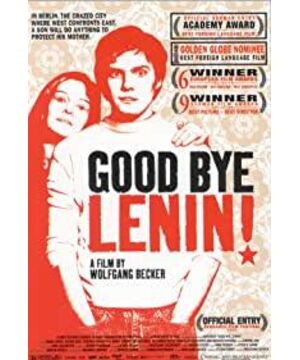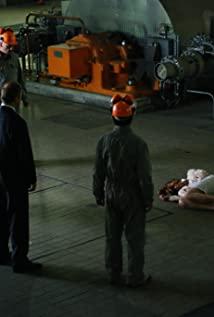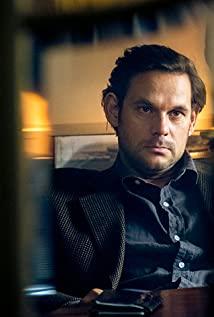After the father "defected", the agents came to the house for questioning. The two children were sitting in front of the TV watching the news of Minde's own astronaut flying into the blue sky, with a focused expression. I want to say who knows the true face of socialism better. Whoever has more feelings for socialism and whose feelings need to be taken care of more carefully? It’s not difficult to see that the mother is actually the accomplice of the father’s escape, just as she revealed to the children at the end of the film that she understands why he left. According to the plan, she should also take the child away.
So after no father, she has maintained the image and feelings of socialism, rather than being a mother who is so active and enthusiastic that she has become an "activist". Her heart is for the children. For the sake of the child, she finally failed to make up her mind to take the child away: waiting for permission to leave the country was a long wait, and, "They want me to be separated from you"-this is the culprit of motherhood, so she did not leave. "This is the biggest mistake of my life, I know it now."
If there is such a sentence, I think that the sentence "for this country, she has always believed in her life and will be unswerving" should be self-defeating. . "Lifelong faith, unswerving" is there. It is her warmth towards her children and the life they can understand and experience. That's why she is so enthusiastic about writing submissions and participating in various socialist advanced activities of the Young Pioneers. Go in, there are enthusiastic little figures of her own children in the playback of these scenes. "Just because he didn't join the party, they made him suffer." She said so much about the experience of her husband as a doctor. How could she be so determined to "marry to the socialist motherland"? ——It’s just the illusion of the children since childhood, especially her son. She has never been committed to that kind of "motherland". ——After her husband arrived in West Germany, she kept writing to her, and she had read it carefully. , Hidden in the most secret corner of the kitchen.
So for (1), I think the answer is self-explanatory. From this point of view, the film seems to be the narrative of the son, and the dust settles down to tell the story of his white lie to the socialist mother who is too poisoned to the end. In fact, on the contrary, it is the mother's white lie to the son first. Recalling carefully, in those advanced activity scenarios, she wrote to the superiors and newspapers for the residents’ life problems, and worked with the young pioneers. She was always doing face-to-face, heart-warming exchanges with people, and the solution was true. The existing problems are for life itself. In other words, she has a choice: she did not go out to publicize the eight honors and eight shames, nor did she participate in the Olympic Yangko team. She is not a political worker who blindly "will remain committed to the socialist motherland." Absolutely not.
Therefore, yes (2), as some friends have pointed out in film reviews, the mother already knows what the truth is. When the director’s childhood idol astronaut played the role of the new leader of the People’s Republic of China on the news broadcast of the announcement of the merger of the two Germanys, she was smiling, and she did not explain the truth.
"The country where my mother passed away is the country she has always believed in. We maintain life until the mother's last breath. A country that will never exist. This country will last forever in my heart and be closely tied to my mother." The
story, It seems that the narration is based on the son's narration, but the narration is actually the opposite. Not only is the dust settled, but also full of nostalgia and farewell. The truth of the story is actually outside of his narrative, and it is made by the audience to analyze and adjust it. On New Year's Eve on the rooftop, he put his mother's ashes into the fireworks and bloomed in the sky, and when he fulfilled her last wish of "floating the ashes into the wind", he looked back on her mother. If you look carefully, you can totally hear that these few sentences are actually not so consistent. "The country where my mother passed away is the country she has always believed in" is emotional, but it is not the truth that our audience knows; but why does he What do you think? ——"This country will live in my heart forever and be closely linked to my mother."
I think this is the fulcrum of this movie. The reason why he was so exhausted, left and right, to create the illusion that the morality of his mother was still there, was not because of how much she felt for the morality, but how much she felt for him, and then he returned his mother's feelings. It was she who saw her son being beaten and dragged away by the police during the parade. After falling down, he fell asleep for half a year, and his life was still in danger. For fear of being stimulated again, his son was looking for bottles and cans from the Minde era all over the street. The capitalist food bought in the supermarket was switched in one by one, and only then did people record fake news on Minde TV over and over again, and then they kept walking down like this.
After I wrote this, I understood why the mother had no medical history, and how did she faint when she saw her son being dragged away by the police? And it's not a small faint, but a faint for half a year.
This again responds to the above question (1). She is more than an unswerving commitment to socialism, she is walking a tightrope knowing its sinfulness! Her husband had been driven away by socialist discrimination, and her son was dragged away by the socialist police. She has lost her husband, —— in order to be with the children, she gave up the application to leave the country, guarding the children, the children can no longer be lost; —— When is Minde the leader? When will socialism be over? An ordinary woman dragging two children, how can she see and how can she wait. All she can wait is for the children to grow up. It can be seen that behind her "marrying to the socialist motherland" and behind this hot mask, how painful and lonely and helpless she is, lest there be trouble again. However, she finally saw his accident.
He was released when an accident occurred, but the reason was: his mother couldn't wake up in the hospital. It seems that it’s a trivial matter to be dragged away by the police during the parade, but the audience will be able to reverse the time a little bit for two or three years, and it will be clear. In the years before the "great change", the environment and memory of the mother has always been Here, in the memories of all those who have been behind closed doors to engage in socialist construction, what is it about being taken away?
For all those who have such memories in mind, socialism has no heads, as long as you want to live your life well. In those closed years, there are only two kinds of people who hope for the end of socialism. One is that they know what socialism is all about before they live; the other is after being hurt by socialism.
The mother already has two children, she can't do the first kind; and she can't do the first kind, just because she can't do the second kind. Socialism is too big for too long, and I only have two children.
Scholars and young people say that the truth, goodness, and beauty in the world are all interlinked, and those with love should not keep silent about the evil, bad governance, and evil deeds in society. In fact, we also hope that the world is like this, and we regard this kind of silence as weakness, and strive to strive for them to be strong.
But for the mother, this kind of concealment, this kind of warm, organized and solid atmosphere of morality, this kind of hope of life persisted in the enthusiasm of the socialist grassroots, this kind of maintenance, is it not another kind of powerful. It's not the kind of indomitable and obligatory power, it's the kind of power that doesn't leak, never twists and turns, is deliberate, and hardworking. The child is tender, and the mother must also be soft. As for the weakness, but the tenacity is unbreakable. Perhaps weakness is one of the destiny of motherhood. Those who can understand this destiny and insist on this weakness are not the kind of mother of Gorky, but this kind of mother.
"Through such continuous fraud, I seem to have turned the GDR into an ideal appearance." He said this when his son was recording fake news for his mother. He has feelings for the GDR. The mother persisted until she fainted and fell down. The efforts made by her were effective. She also "through such continuous fraud, I seem to have turned the GDR into an ideal appearance." She and his "fakes" are both. What is different from the vast reality of society is fantasy, so it is said to be "fake"; but it is their expectation and the hope of life on which they depend.
In the days of Minde, the mother was always a enthusiastic person, so enthusiastic and so high, but the story also gave us a circumstantial evidence: When the mother finally woke up, the son would arrange for her a Minde sympathy meeting and invite her The old principal, the two talked. The old principal affirmed that she was an outstanding teacher, but his son asked directly: "So she was beaten into the cold palace?"-The old principal said: "Several comrades in the organization think she is too... Idealism".
Is the persistence of "idealism" the perverted compensation that this hard-earned mother seeks in the lies of socialism? If reality is a lie, then sometimes it is true, and it is also suspected to be false; if you insist on the truth, you have to withstand the form of "falsification". Mothers are so enthusiastic about activities, not how "idealistic" they are about socialism. Children with mothers know that a mother who has to worry about what to do is hard to have ideals about political policies, let alone doctrine. She should be very clear. She is under the name of "idealism", trying hard to do things with real heart and affection, life itself, life itself, and direct the young pioneers to sing, sing the green grass and the field, Put on a swimsuit and painted face to party with the children.
Here, the morality is no longer the morality of the Honeckers, but the morality of the mother and the child. The morality between them, the common morality between them, each has a feeling and memory, and it is difficult to support. Others. "This country will live in my heart forever, and be closely tied to my mother."
Until the end of the play, I didn't wait to see what I had hoped in the beginning. The son, the narrator, this young man, can have some insights into the morals of the people. , So as to offset the constant complaints about the new Germany from the elders, but no. He is a pure-hearted person, and at the end of the play, he has complicated feelings about people's morals. Perhaps this does not meet the expectations of some viewers, but for most ordinary people and those who bear the most ordinary basic life, the evolution of the country and the texture of history are indeed like this. In the future, most of us young people will live like this, perhaps including myself.
There are choices in life, but at the same time people often overlook the back of choices: finite. Life is also limited. Many choices are often given up, not because they don't want to or understand, but because they have been chosen by others: love, family. They should not be questioned or blamed. If in an ugly society, someone can give children the ardent and sincere love while ignoring those ugliness. I don’t think it should be criticized, but it is just to be fortunate.
I want to add black here, and say it again: If in an ugly society, someone can give children the ardent and sincere love, and ignore those ugliness. I don’t think it should be criticized, but it is just to be fortunate. Because of their limited choices, their responsibilities are limited. Rather than craving for judgments on the world, morality lies in the realization of responsibilities.
Yu Jin, a young man with a critical mind in history, looks at his family from time to time while he looks at his characters so happy. I don't know if others are like this, I was like this once. I have watched this movie tonight, and in the questions I asked at the beginning, I still felt that the story was not credible.
The mothers in the movie, like many of our hard-working parents, will only understand when you look back suddenly that although they are busy, they are not socialist fools and prisoners of life.
View more about Good Bye Lenin! reviews











